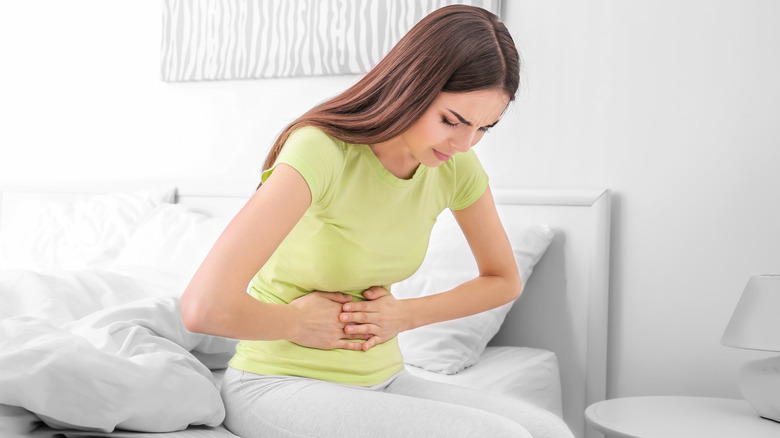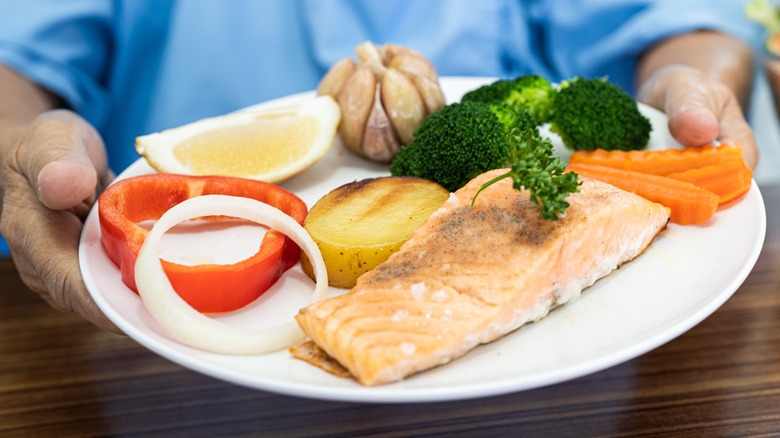The One Supplement You Shouldn't Take In The Morning, According To A Registered Dietitian
Whether in the morning, evening, or following a meal, just as the timing of our prescription medications is important, so is the timing of supplements. In an exclusive interview with Health Digest, we spoke with Sapna Bhalsod, registered dietitian at WellTheory – a digital nutrition and lifestyle-based coaching solution for chronic conditions, like autoimmune disease – and member of the growing BIPOC community driving diversity in dietetics and nutrition. While many supplements are perfectly fine to take come morning time, Bhalsod shares which one we should avoid taking in the early hours of the day: vitamin D.
Bhalsod starts off by explaining the numerous benefits that vitamin D has to offer us. "Vitamin D not only plays an integral role in bone health and mineral regulation, but it also modulates our immune system," she states. Referencing a 2012 study published in the Journal of Investigative Medicine, Bhalsod explains that without enough vitamin D, we leave ourselves more prone to infection and autoimmunity.
Taking vitamin D in the morning on an empty stomach can come with side effects
"While getting vitamin D through sunlight when you first wake up is great, if you take it in supplement form as soon as you wake up, you risk malabsorption and gastric upset," Bhalsod tells Health Digest.
"While there are certain supplements better absorbed when taken in the morning on an empty stomach, there are some that need fat in order to do their job," Bhalsod explains. "Fat-soluble vitamins, like vitamin D, should be avoided first thing in the morning," she says. "Instead, take it with or after a well-balanced meal packed with healthy fats, protein, and carbohydrates."
Bhalsod states that taking vitamin D during or post-meal helps us sidestep any potentially unpleasant side effects. "Those fats — especially cholesterol — are key to reaping the benefits of vitamin D and avoiding possible gastrointestinal distress (nausea or upset stomach) for those with sensitivities," she explains. Even more, Bhalsod suggests pairing vitamin D with your biggest meal. "I recommend taking it at your largest meal of the day — whether that's typically breakfast, lunch, or dinner — when you're presumably eating more fats," she says.
However, if you're short on recipe inspo, fear not. Bhalsod goes on to offer up some of her favorite meal suggestions that support vitamin D absorption.
How to support vitamin D absorption
"My ideal meal for supporting vitamin D absorption, reducing inflammation, and improving gut health is a 'nourish bowl,'" she states. "Grilled salmon, sweet potatoes, some sautéed garlic, mushrooms, and tomatoes with a side of sauerkraut. I'll top this over a bed of leafy greens and drizzle on homemade chili olive oil dressing," she says. "What I love about this meal is that you can use whatever vegetables you have on hand, and it's easy to prep for a busy week."
Referencing a 2020 study published in Nature Communications, Bhalsod says that our gut health is a key player when it comes to vitamin D absorption. "If you're fueling your body on highly processed foods and consider colorful vegetables and fruits an afterthought, it will be much harder for your body to absorb any nutrients, including vitamin D," she says. "Vitamin D is incredibly helpful for regulating your intestinal barrier or gut structure and, in turn, modulating your immune system. It also boasts anti-inflammatory effects in the gastrointestinal tract."
Bhalsod notes that it's best to consult with your physician before starting vitamin D supplementation, particularly for those with certain health conditions. While there are no known interactions between vitamin D and other supplements, she points out that vitamin D has a hand in calcium and phosphorus regulation. "So if you are someone struggling with chronic kidney disease or on dialysis, supplementation should be closely monitored by a health professional."



